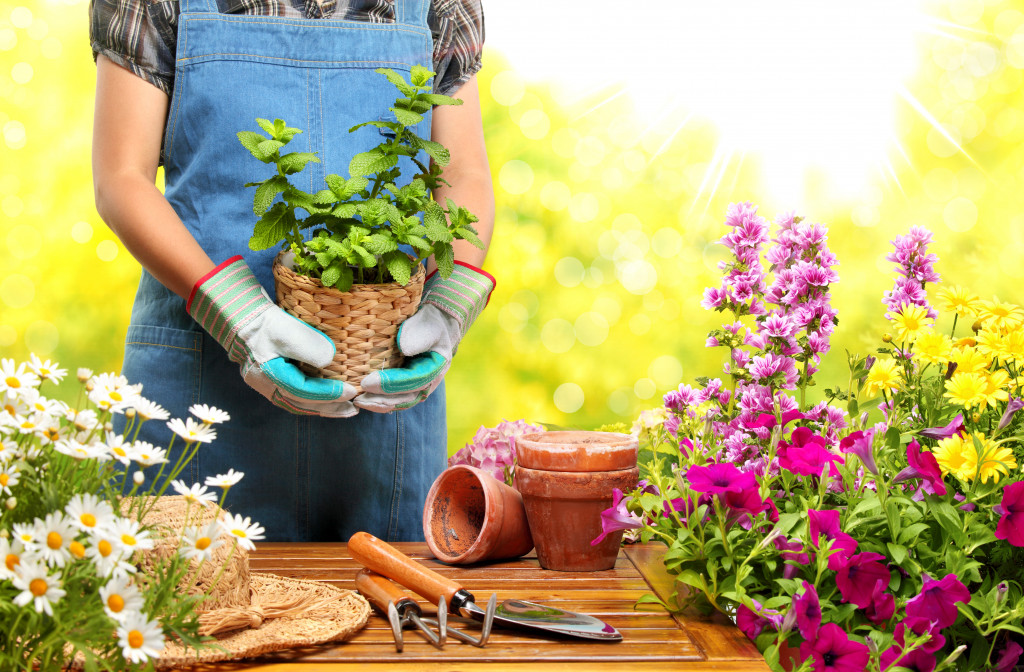- Starting small and understanding your environment are crucial initial steps in successful home gardening.
- Select plants you love, consider maintenance needs, and invest in quality soil to ensure healthy plant growth.
- Patience is essential in gardening, requiring an understanding of each plant’s unique growth timeline and resilience in the face of challenges.
- Gardening is as much about the process as the outcome, emphasizing enjoying and learning from the experience cultivating peace and presence.
You’re on the right track if you’re considering home gardening as a new relaxation method. Gardening not only provides a tranquil environment but also helps reduce stress levels. Here are a few tips to get started:
Start Small
Starting small is a wise approach for beginners in home gardening. It’s easy to get excited and overly ambitious but remember, each plant requires care and attention; therefore, managing a smaller garden is less overwhelming. Here are some tips for you:
Understand Your Environment
Before you embark on your gardening journey, it’s important to comprehend the environment in which your garden will thrive. Evaluate the amount of sunlight your space receives, which is crucial to plant growth. In addition, test your soil type—sandy, clay, or loam—as different plants prefer different soils.
Take note of your region’s temperature range and precipitation levels, as these will influence the types of plants that can survive. Don’t overlook the local wildlife, which can either aid or harm your garden. For example, certain birds and insects can be beneficial, promoting pollination or feasting on pests. Understanding your environment is the foundation for creating a garden that survives and thrives. Remember, a keen gardener works with nature, not against it.
Choose Plants You Love

Choosing plants that you genuinely love will not only add beauty to your garden but will also give you the motivation to care for them regularly. The options are countless, from blooming flowers that add color and fragrance to edible plants like herbs, vegetables, and fruits that can be a rewarding addition to your meals.
Consider the maintenance needs of your chosen plants; low-maintenance plants are often best for beginners. For example, succulents require little water and can thrive in various light conditions, while tomatoes and basil are relatively easy to grow and provide a delightful addition to your kitchen.
Some plants, like lavender, can also provide therapeutic benefits, filling your garden with a soothing scent. Making your garden reflect your preferences and personality can transform it into a sanctuary for relaxation and enjoyment. Remember, the goal is to create a garden that brings you joy.
Quality Soil

Quality soil is the backbone of a thriving garden. It provides the essential nutrients and water plants need to grow and flourish. Therefore, investing in good-quality soil is paramount. Initially, assess your existing soil type: sandy soil drains quickly and needs frequent watering and nutrient replenishment, clay soil retains water well but drains poorly, which may lead to root diseases, while loam, a balanced mix of sand, silt, and clay, is considered ideal for most plants.
If your native soil is not ideal, consider amending it with organic matter such as compost or manure to improve its nutrient content, texture, and water retention capabilities. Alternatively, you may opt for pre-mixed potting soil for container gardening. A soil test kit can be an invaluable tool to determine your soil’s pH and nutrient levels, allowing you to make necessary adjustments. Always remember, that a healthy garden starts with healthy soil.
High-Quality Raised Garden Beds
High-quality raised garden beds offer multiple benefits for your gardening endeavors. Their elevated design provides a barrier against pests and weeds, keeping your plants healthier and making your gardening tasks easier. These beds also allow for better control over soil quality since you’ll be filling them with a soil mix of your choice.
This can be especially beneficial if the native soil in your area isn’t ideal for plant growth. Raised beds also promote improved soil drainage, ensuring that plants aren’t waterlogged and reducing the risk of root diseases.
Furthermore, the elevated design makes it easier to tend to your plants without straining your back and joints, providing a more comfortable gardening experience. In terms of aesthetics, raised beds can also enhance the overall look of your garden, adding structure and visual appeal. Investing in high-quality raised garden beds can therefore significantly elevate your gardening experience.
Be Patient
Gardening, like all great endeavors, requires patience. From the moment you sow your seeds to when you harvest your crops or see your plants bloom, it’s a journey of anticipation and care. Each plant has its timeline to germinate, grow, and bear fruit or flowers; rushing this process can lead to disappointment.
Remember, nature follows its rhythm, which may not always align with our expectations. It’s important to remain patient and allow your plants the time they need to flourish. Patience also means persistence and resilience when faced with gardening challenges such as pests, diseases, or unfavorable weather.
Investing time and patience will reward you with the satisfaction of seeing your garden thrive, which can be an incredibly nourishing experience. In essence, patience isn’t just a virtue in gardening, it’s a necessity – much like sunlight and water.
Enjoy the Process
Gardening is as much about the journey as it is about the destination. Enjoying the process is vital for any gardener, not just for the garden’s sake, but for your wellbeing. As you plant, water, and nurture your garden, appreciate its simple pleasures.
Feel the soil in your hands, breathe in the fresh scent of growing plants, and marvel at the life sprouting from your care. Each day holds a discovery, whether a sprouting seed, a budding flower, or seeing a bird or insect visiting your garden.
Find joy in the progress, no matter how small, and learn from the challenges. Ultimately, gardening isn’t merely about cultivating plants, it’s about cultivating patience, presence, and peace within yourself. So take a step back, look at your work, and savor the growth process in your garden and within you.
You can transform your space into a green haven with careful planning, patience, and much love. So, why wait? Begin your gardening journey today. Start small, choose your favorite plants, invest in rich soil, and remember to enjoy each step of the process. Your garden is waiting for you!




